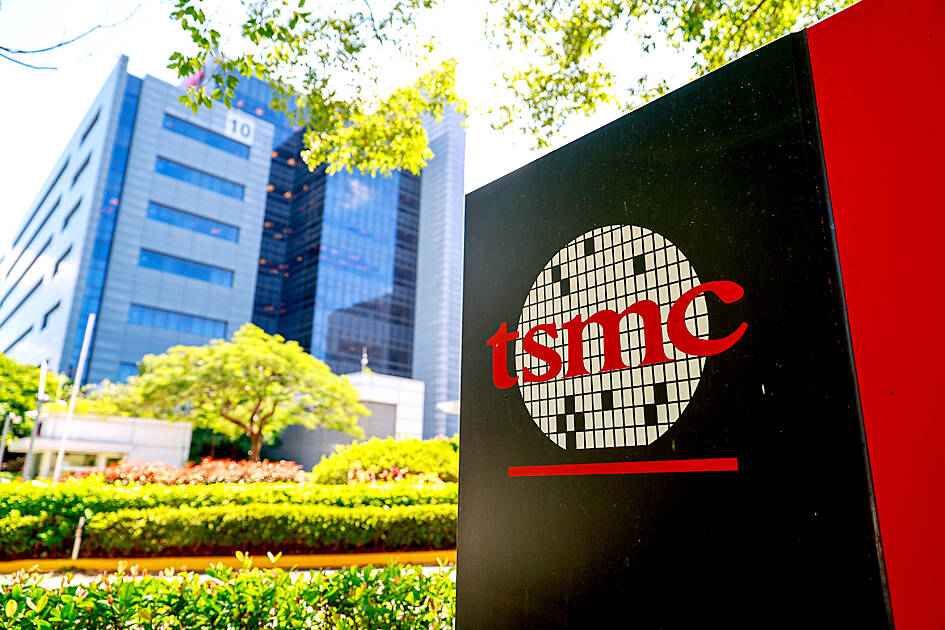Taiwan Semiconductor Manufacturing Co (TSMC, 台積電), the world’s largest manufacturer of advanced artificial intelligence (AI) chips, is expected to post a 28 percent jump in third-quarter profit to a record due to the insatiable demand for AI infrastructure, though US tariffs could impact its outlook.
TSMC, the world’s No. 1 contract chipmaker and a key supplier to Nvidia Corp and Apple Inc, is forecast to report a net profit of NT$415.4 billion (US$13.55 billion) for the three months through Sept. 30, according to an LSEG SmartEstimate compiled from 20 analysts.
SmartEstimates place greater weight on forecasts from analysts who are more consistently accurate.

Photo: Ritchie B. Tongo, EPA
TSMC has already flagged a market-forecast-beating rise in third-quarter revenue of 30 percent. Any profit result above NT$398.3 billion would mark the company’s highest-ever quarterly net income and its seventh consecutive quarter of profit growth.
Mario Morales, group vice president at research firm IDC, said he expects TSMC’s revenue to grow at least 30 percent to 35 percent this year.
"I am expecting that TSMC will continue to outperform its peers given the ongoing exponential growth of AI infrastructure investments and that the leading chip suppliers such as Nvidia and AMD [Advanced Micro Devices Inc] have only one place to go — TSMC," he said.
Morales said that even as tariffs and trade disputes add uncertainty, AI infrastructure remains a "strategic land grab" for cloud-service providers, manufacturers and companies, ensuring investment continues to concentrate in that space.
TSMC, Asia’s most valuable listed company with a market capitalization of around US$1.22 trillion — nearly three times that of South Korean rival Samsung Electronics Co — is due to report on Thursday and will provide fourth-quarter guidance in an earnings call.
It remains unclear how much US President Donald Trump’s tariffs will affect TSMC. Taiwan’s exports to the US are currently subject to a 20 percent tariff, but that excludes chips.
US Secretary of Commerce Howard Lutnick proposed last month that Taiwanese companies split their production of chips 50-50 between Taiwan and the US, compared to the current setup where the vast majority of the production is in Taiwan.
Taiwan has rejected that idea, and TSMC is already investing US$165 billion building factories in the US in Arizona.
Shares in TSMC have gained 30 percent so far this year on optimism over AI, largely brushing off tariff concerns. The heavyweight’s rise has powered the benchmark TAIEX’s 16.9 percent advance over the same period.

Taiwan’s foreign exchange reserves hit a record high at the end of last month, surpassing the US$600 billion mark for the first time, the central bank said yesterday. Last month, the country’s foreign exchange reserves rose US$5.51 billion from a month earlier to reach US$602.94 billion due to an increase in returns from the central bank’s portfolio management, the movement of other foreign currencies in the portfolio against the US dollar and the bank’s efforts to smooth the volatility of the New Taiwan dollar. Department of Foreign Exchange Director-General Eugene Tsai (蔡炯民)said a rate cut cycle launched by the US Federal Reserve

The US government on Wednesday sanctioned more than two dozen companies in China, Turkey and the United Arab Emirates, including offshoots of a US chip firm, accusing the businesses of providing illicit support to Iran’s military or proxies. The US Department of Commerce included two subsidiaries of US-based chip distributor Arrow Electronics Inc (艾睿電子) on its so-called entity list published on the federal register for facilitating purchases by Iran’s proxies of US tech. Arrow spokesman John Hourigan said that the subsidiaries have been operating in full compliance with US export control regulations and his company is discussing with the US Bureau of

Businesses across the global semiconductor supply chain are bracing themselves for disruptions from an escalating trade war, after China imposed curbs on rare earth mineral exports and the US responded with additional tariffs and restrictions on software sales to the Asian nation. China’s restrictions, the most targeted move yet to limit supplies of rare earth materials, represent the first major attempt by Beijing to exercise long-arm jurisdiction over foreign companies to target the semiconductor industry, threatening to stall the chips powering the artificial intelligence (AI) boom. They prompted US President Donald Trump on Friday to announce that he would impose an additional

Pegatron Corp (和碩), a key assembler of Apple Inc’s iPhones, on Thursday reported a 12.3 percent year-on-year decline in revenue for last quarter to NT$257.86 billion (US$8.44 billion), but it expects revenue to improve in the second half on traditional holiday demand. The fourth quarter is usually the peak season for its communications products, a company official said on condition of anonymity. As Apple released its new iPhone 17 series early last month, sales in the communications segment rose sequentially last month, the official said. Shipments to Apple have been stable and in line with earlier expectations, they said. Pegatron shipped 2.4 million notebook